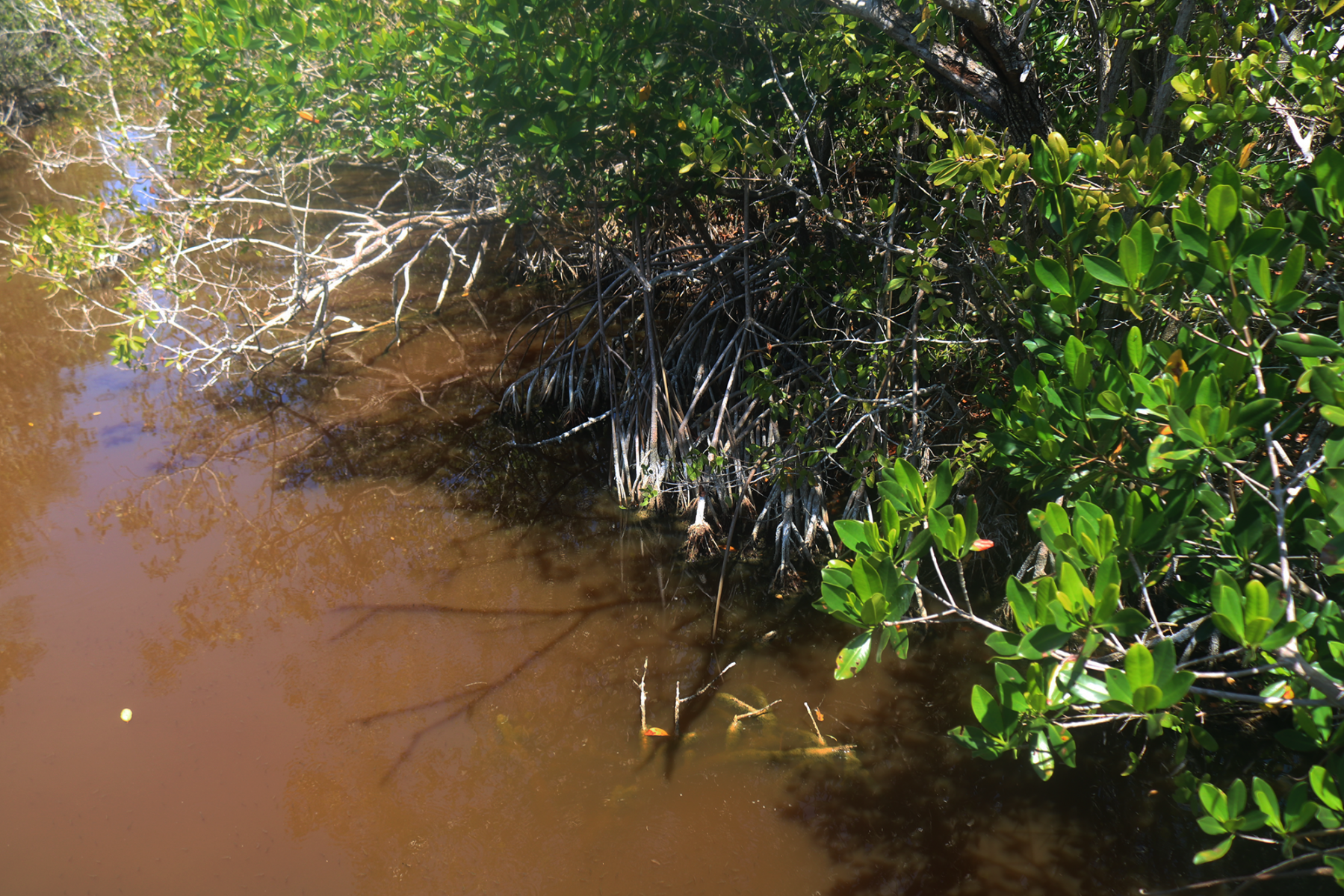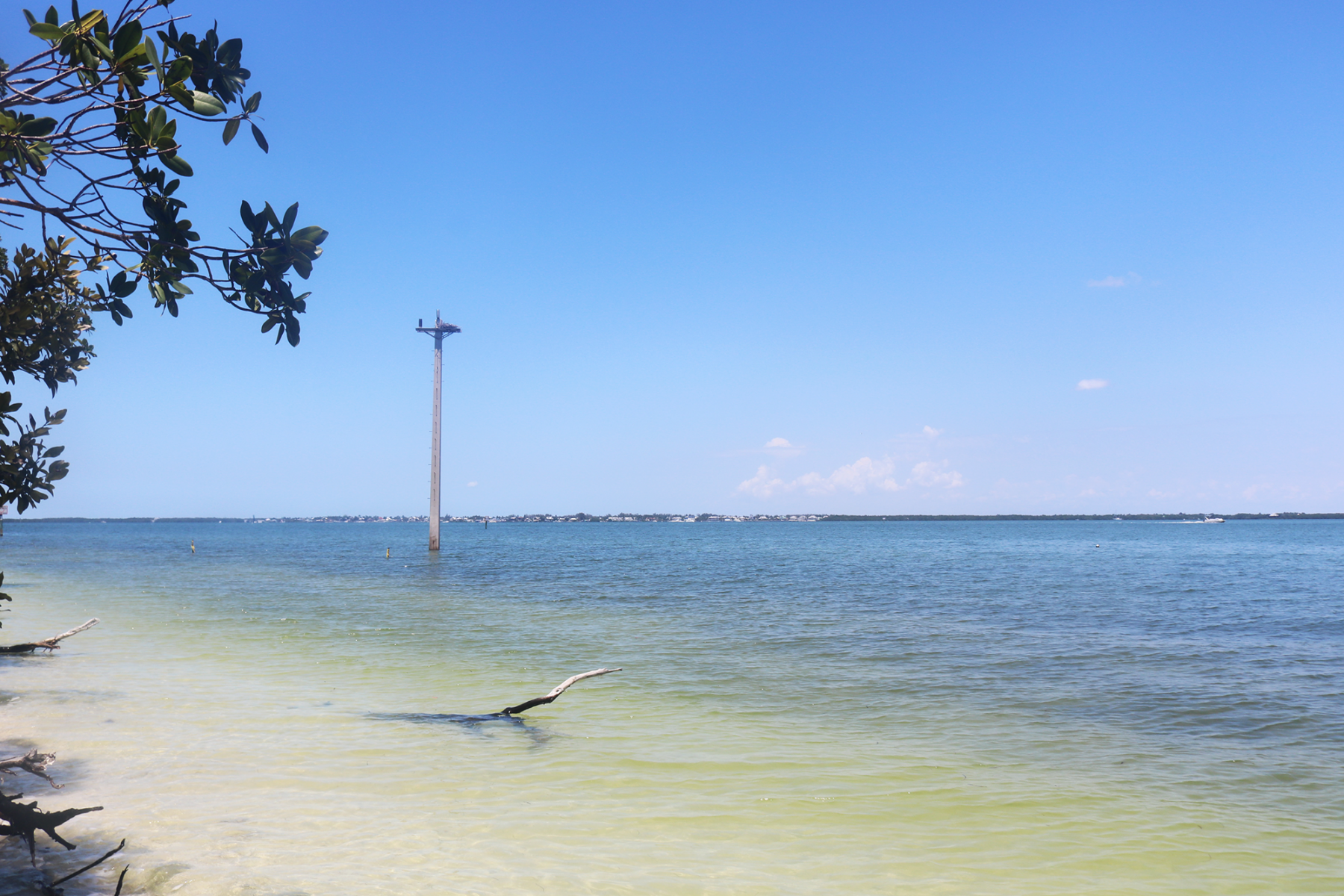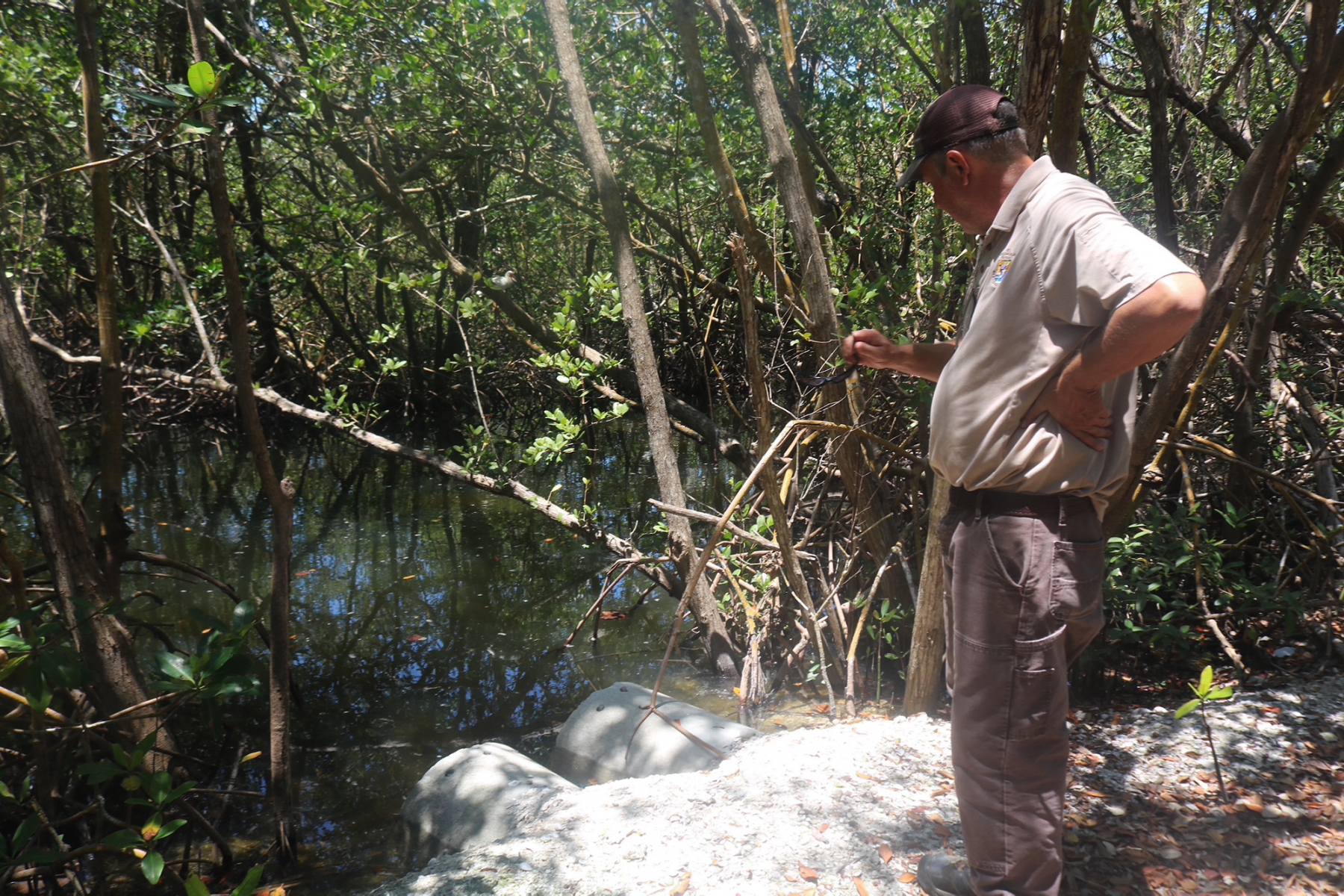
Volunteers plant mangrove saplings to help restore the canopy at Benedict Key. (Sarah Anderson/MEDILL)

Volunteers plant mangrove saplings to help restore the canopy at Benedict Key. (Sarah Anderson/MEDILL)
By Sarah Anderson
A successful day out on the water requires all the standard equipment — sunscreen, snacks and a literal boatload of mangrove saplings and fossilized shells.
The Sanibel-Captiva Conservation Foundation (SCCF), based on Sanibel Island, Florida, has led regular trips to restore Benedict Key — a tiny uninhabited island in Pine Island Sound — since early 2021. Benedict’s canopy of coastal mangrove trees, which provide habitat for heron, osprey, ibis and egret birds, is gradually recovering after sustaining severe damage from Hurricane Charley in 2004. Volunteers are helping accelerate the process by planting mangrove seedlings and saplings to promote regrowth. They are also depositing fossilized shells that provide a foundation for oyster attachment, aiming to build up an oyster reef to shield the fledgling mangroves from destructive waves.
“The mangroves that we planted at the beginning of the restoration effort are, for the most part, still there and thriving,” said Kealy McNeal, the conservation initiative coordinator at SCCF. “So it’s a very good sign that we’re going to be successful with the restoration of Benedict.”
Elsewhere on Sanibel Island, however, mangrove restoration requires addressing systemic hydrological issues. High levels of nutrients in the water and developments that have altered the way water moves among the trees are threatening the health of mangrove forests and their ability to respond to climate stressors. Researchers at the J.N. “Ding” Darling National Wildlife Refuge on Sanibel Island are analyzing the impacts of water quality and flow on the island’s mangroves to inform restoration projects and adaptation efforts.

The ecosystem services of the mangrove tree are as plentiful and intertwined as the network of roots at its base. These roots, which extend underwater, serve as a nursery for fish, while the branches provide a nesting site for birds. By supporting wildlife, the mangrove canopy at the J.N. “Ding” Darling National Wildlife Refuge is estimated to generate an average of $85 million per year in recreational viewing and fishing revenue, according to a provisional United States Geological Survey (USGS) ecosystem services assessment.
And by storing carbon dioxide, absorbed through photosynthesis, in their roots and trapping carbon-containing matter in their soil, mangroves are a highly productive carbon sequestration system. The approximately 2,500 acres of mangrove at “Ding” Darling store an estimated average of 364,000 metric tons of carbon, according to a 2021 study. That’s equivalent to the amount of carbon dioxide emitted from the gas tanks of almost 5,000 tanker trunks. Maintaining this carbon stock yields an estimated economic value of over $55 million, according to the USGS assessment.
Mangroves can also form a buffer that protects the coast from surging water during storms. But as Hurricane Charley revealed, mangroves themselves can take a beating from the heavy winds. In the 2021 study, researchers analyzed the “Ding” Darling mangrove canopy and found that the trees that have not recovered from the hurricane are located in a tidally restricted area of the refuge.

In the 1960s, a dike was constructed on the refuge to concentrate standing water for mosquito control and was later used to manipulate the water level to create habitat for migratory waterfowl. Despite these advantages, the disruption to the refuge’s natural hydrology has detrimentally impacted mangroves in “impounded” areas that are disconnected from the surrounding waterways.
Water exchange from incoming and outgoing tides is critical for healthy water quality — and mangroves. When bacteria break down algae and other organic matter in the water, they consume oxygen. If the oxygen level of the water drops too low, other bacteria use sulfur compounds instead of oxygen, producing hydrogen sulfide in the process. Mangroves in impounded areas don’t experience sufficient tidal flushing, which can lead to a buildup of hydrogen sulfide that stresses the trees.
“We’ve seen this all over southwest Florida, where even small changes in the tidal hydrology that was original to the system can cause long-term stress,” said Ken Krauss, an ecologist at USGS.
Due to this stress, mangroves in impounded areas of the refuge struggle to produce seedlings. They also receive fewer seedlings from trees outside the impoundment, which are delivered through tidal flushing. Collectively, these factors can impede the regeneration of tidally restricted mangroves after a hurricane.
Tunnel-like culverts have been constructed to reconnect some of the water flow between the two sides of the dike, but they don’t fully restore the refuge’s natural hydrology. “It’s like breathing through a straw,” said Jeremy Conrad, an ecologist at the United States Fish and Wildlife Service.
The dike is not the only example of altered hydrology on Sanibel Island. In a waterfront residential area, mangroves were cut off from tidal flushing by the construction of a road, which requires regular maintenance as the rising sea laps at its edges. Debris from the roadwork combined with organic material to form a hard deposit along the coastal side of the canopy, further restricting water flow.
The forest die-off was a case of “mangrove heart attack” — a seemingly overnight manifestation of underlying issues caused by reduced tidal flushing. The death of the mangroves has exacerbated shoreline erosion on this vulnerable part of the island, said Bob Gerwig, a wildlife refuge specialist at “Ding” Darling. “When these mangroves die off, all that root structure decays, and the soil subsides and it collapses. So then we’re losing that resiliency to sea level rise and climate change,” he said.

For mangroves growing in smaller bodies of water, simple concrete culverts have made a big difference in restoring hydrological connection. Since a culvert linking a mosquito control ditch to the island’s Tarpon Bay was repaired three years ago, its mangroves have begun to show signs of recovery. “You may be breathing through a straw, but you’re breathing,” Gerwig said.
Gerwig hopes to help larger swaths of impounded mangrove in the refuge breathe through bigger “straws” by breaking up the dike with raised boardwalks and bridges. “Mangroves are a very slow grower and they respond to stressors and reliefs in a very slow manner. So these restorative actions are going to take time,” he said. “It’s so easy to break something, and it takes decades to put it back together.”
Unfortunately, mangroves might be impacted by another anthropogenic factor: eutrophication, or the enrichment of nutrients such as nitrogen and phosphorous in the water. The water bodies surrounding Sanibel Island receive large amounts of agricultural and wastewater nutrients from discharges from Lake Okeechobee and the Caloosahatchee River. “Sanibel is right at the dumping point where everything flows right toward us, and it very much influences what happens on the ‘Ding’ Darling wildlife refuge,” said Avery Renshaw, a biological science technician at the refuge.
Just as nutrients in fertilizer help plants in a garden grow, nitrogen and phosphorous supplied by tidal flushing benefit mangroves in low-nutrient environments. “But what we’re finding is that when the system is under a high level of fertilization or eutrophication for long periods of time, it can actually become a detriment to the system,” Conrad said.

To adapt to sea level rise, mangroves gain vertical elevation by accumulating leaf litter and sediment and growing their roots. When they are exposed to low levels of nutrients, mangroves develop extended root systems to forage for nitrogen and phosphorous, helping them build vertical elevation. But mangroves that are bombarded with nutrients may shift their energy to growing the aboveground portion of the tree at the expense of the roots, which could hinder the elevation process.
To evaluate the impact of nutrient loading on the mangroves at “Ding” Darling, Conrad fertilized the soil with nitrogen or phosphorous and measured the growth of the tree above and below ground and any changes in the elevation of the soil over four years. While he observed some growth and metabolic shifts that hinted at adaptations to eutrophication, he did not find a significant difference in the soil elevation change in the phosphorous- or nitrogen-treated mangroves compared to the control plots. The minimal effect might be because “what we put in the ground was a drop in the bucket compared to what was already in the system,” Conrad said. It’s also possible that the influence of the additional nitrogen and phosphorous could take more time to appear in a high-nutrient environment, Krauss said.

With some experimental optimization, the team aims to incorporate the results into a model to forecast the effect of sea level rise on mangrove cover at the refuge over time. “In perpetuity, as we continue to get more data and a better understanding, we can begin to model and project what elevations look like in the forest versus what the elevations of the oceans are doing,” Conrad said. “And then that gives us a model to predict what our lands will look like 30, 40, 50 years from now under these accelerated rates of sea level rise.”
Krauss hopes the project will help mangrove managers at the refuge and beyond prepare for and respond to climate-related disturbances. “This is a changing world, and we have to figure out how to adapt properly to it,” he said.